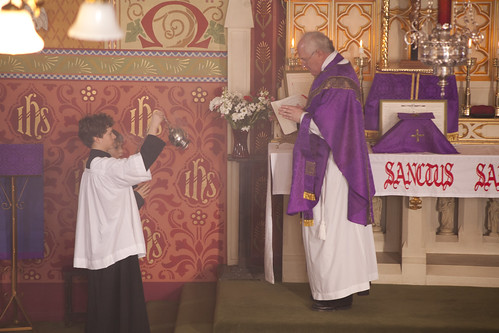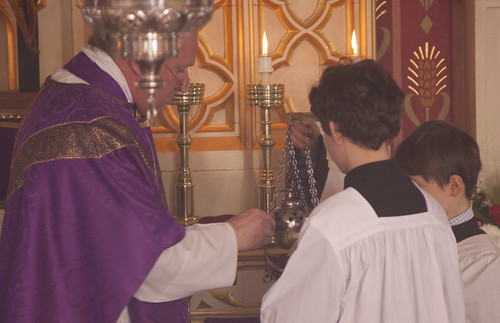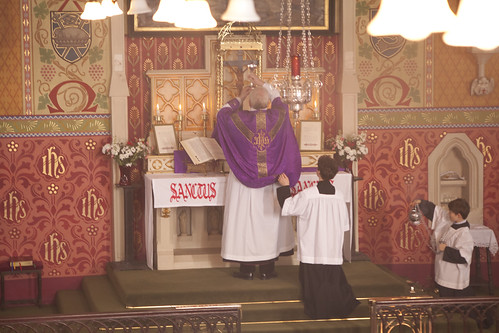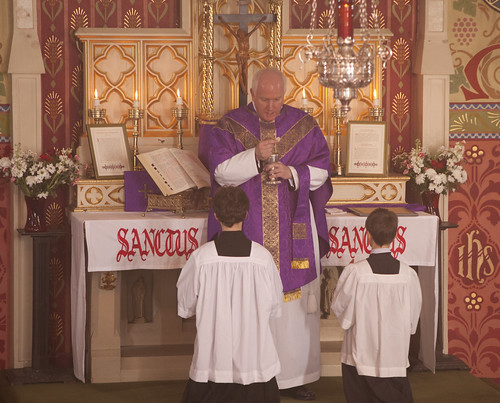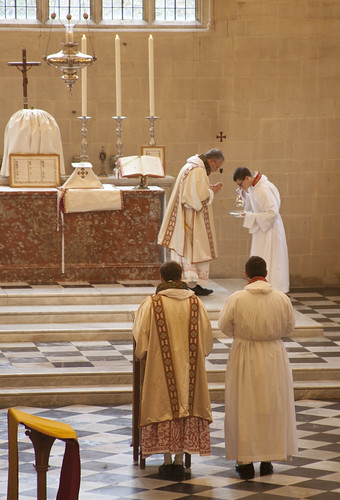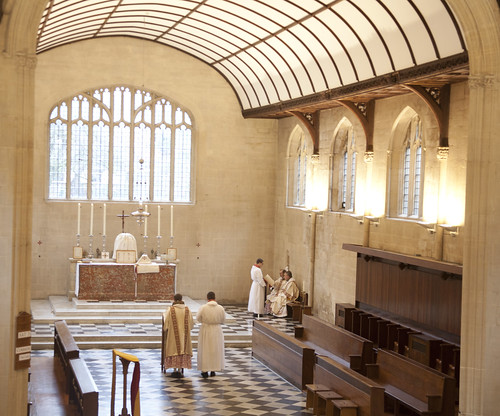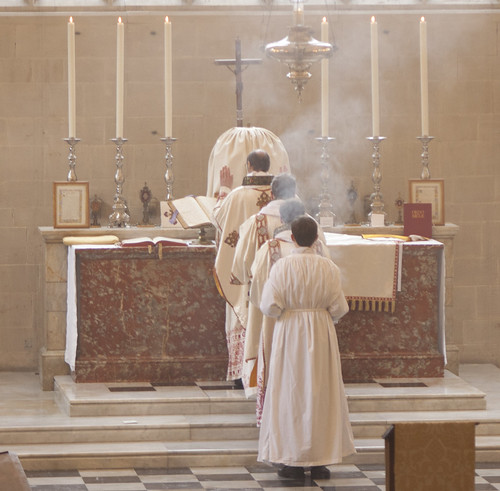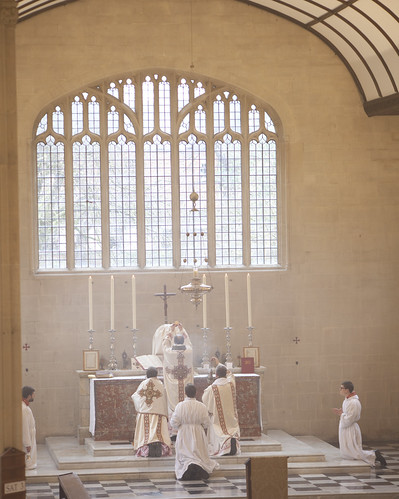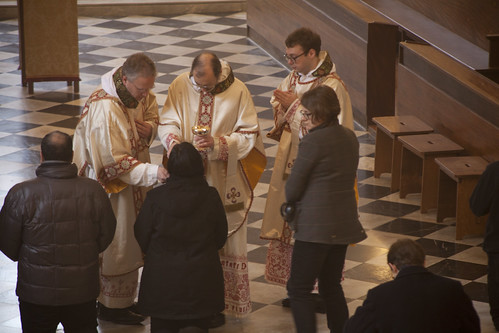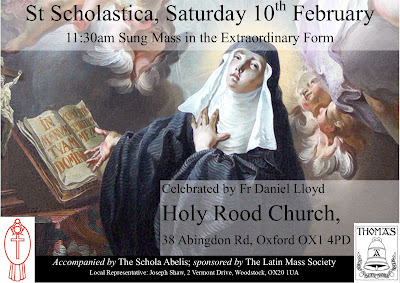Chairman's Blog
Holy Trinity Hethe welcomes Fr Anthony Talbot
As of the beginning of January Fr Anthony Talbot has been celebrating the Traditional Mass in Holy Trinity, Hethe, outside Bicester (Hardwick Road, Hethe, OX27 8AW). After a period of having a rota of priests coming from different places it is good to have a single pastor again, in this beautiful historic church.
We are very grateful for the priests who between them covered the gap between Fr Paul Lester and Fr Talbot, while the Presbytery was being refurbished and was uninhabitable. This maintained the Sunday provision established by Fr Lester three years ago.
The Traditional Mass in Hethe is celebrated every Sunday at 12 noon. On the second and fourth Sundays of the month it is a Missa Cantata. We are also planning some occasional Masses with polyphony.
Support the work of the LMS by becoming an 'Anniversary Supporter'.
A Dominican Mass for St Thomas Aquinas
The Schola Abelis sang for a High Mass in the Dominican Rite at Blackfriars, Oxford, last Saturday.
This Mass, celebrated just because the various people involved - singers, Dominicans - simply thought it would be rather nice, attracted fifty people. These Masses now happen near the beginning of each University Term.
It was celebrated in honour of St Thomas Aquinas, whose feast day is this term (on different dates in the old and new calendars).
It is one of the great privileges of involvement in the Latin Mass Society that we can facilitate such devotional occasions. The LMS is about making good things happen! Although I must apologise for the inactivity of this blog, my time has in part been taken up with future events which will be advertised and reported here.
Support the work of the LMS by becoming an 'Anniversary Supporter'.
The Statistical decline of the Church
Inspired by some discussion on Twitter about the Church's failure to oppose the legalisation of abortion in the 1970s, effectively, I'm reposting this from April 2013. And with apologies for not posting for so long.
 |
| Counter-cultural young ladies at the Family Retreat |
As I wrote in the last post, contrary to the gremlins which have falsified the figures for mid-century ordinations in England and Wales on the Vocations Office website, the Catholic Church was riding high by every conceivable measure in the middle of the 20th century. Figures for ordinations and the like peak in or shortly after the 1960s. This is true all over the West: outside the Communist bloc, throughout Europe and North America. Vatican II and the subsequent reforms took place at precisely the time the decline commenced. QED.
Actually, it is not as simple as that. For the Church's difficulties coincided with very similar problems for a whole range of other organisations. As I have blogged before, membership organisations of all kinds grew rapidly in the first half of the 20th century, and began to decline in the 1970s. Not only that, but a number of other measures of 'social capital', such as whether people trust strangers or know their neighbours, rose and declined in exactly the same way. It is an extraordinary phenomenon.
 |
| A public sign of penance, on Ash Wednesday in Oxford |
Previously I blogged about how commuting times and television have made it much harder to get people to come to face-to-face meetings, which were so characteristic of life in the mid-century: clubs and dinner parties, or of course sodalities and parish groups. Another important factor is the increased female rate of participation in the workforce: women who didn't go out to work had more time to maintain the social fabric of their communities. These go some way to explaining the decline of the Freemasons, poker-playing clubs, and what have you.
At least to some extent, trends of church-going can be explained in the same way: people don't want to spend their time in that way. And church-going has declined across the denominations.
Can the difficulties of the Catholic Church be put down to social factors, then? No. The explanation won't work.
 |
| Counter-cultural young men, Good Friday with the FSSP in Reading |
Robert Putnam's great study of this phenomenon, 'Bowling Alone', looks with great care at all sorts of correlations to see what can explain the general decline of what he calls 'social capital'. TV, commuting, and female participation in work are all important factors, in that order. His figures show, interestingly, that Americans, at least, don't work longer hours, or move house more frequently, than in former decades, so those factors can be set aside. But there are two other issues: one is a huge correlation to the baby-boom generation. The other is that his efforts leave about 20% of the shift in behaviour unexplained.
Looking at what people did when at the age of 20, 30, 40, or 50 allows us to detect changes in behaviour between generations: people who were 20 in 1975 behaved differently from those who were 20 in 1955, and so on. Putnam says the baby-boom generation, coming of age in the late 1950s onwards, are less sociable: they do less of all the 'social capital' things he is interested in, including church-going. This observation is not exactly an explanation: why did they behave differently? The closest Putnam comes to an answer is 'values'. Annoyingly, he doesn't compare his results with surveys of social attitudes; perhaps comparable historical data does not exist. But he must be right: there was an ideological shift.
This would also explain the 20% gap of explanation in everyone else. Why, says Putnam, do even those people living essentially 1950s lifestyles in the 1980s - wife not going out to work, living in a small town, not watching TV morning noon and night, etc. etc. - why do even these people, once statistically isolated, still show declines of church-going, dinner-party giving etc.? Well, if the baby-boomers had a distinct ideology, it is hardly surprising that even some of the older generation picked this up to an extent as time wore one.
 |
| Putnam's summary pie chart, from 'Bowling Alone' p284. |
(Putnam's pie: 'Work' includes women going to work; 'Sprawl' includes commuting to work and also to less local shops. The overlap between TV and 'Generational Change' is the difference made by growing up with TV in explaining why the younger generation is less socially engaged. Other factors, which Putnam attributes vaguely to 'values', explains the rest of the 'Generational Change' segment. 'Other' is the part he can't explain at all.)
In other words, the 'social change' explanation of the Church's decline gives a very large space for change as a result of changing values or ideology, as well as things like commuter times and the invention of the telly. We cannot say that the Church is simply a victim of this change, because, particularly looking back to the mid century, the Church is a major player in the formation of values. And as we all know, one of the effects of the 'Spirit of Vatican II', in the lead up to the Council and after it, was a deliberate policy of not resisting the values of the new generation.
 |
| Canon Meney ICKSP joins the Walsingham Pilgrimage last year. |
It is true that other churches were also effected. But then other churches took very much the same line, for similar reasons and at the same time.
The 1960s saw a social revolution which was fundamentally hostile, not only to the Church, but to all kinds of institutions essential to social cohesion. It was precisely this moment which the Church chose to give up, or seriously tone down, its campaign against these values. The new values could, I suppose, be summarised as materialism, or alternatively an interest in crack-pot spirituality (or sometimes both); and an individualism which rejected all kinds of rules. On the one hand, the Church seemed to be doing extraordinarily well, with full seminaries and lots of converts over the previous decades; on the other, there was great pressure to let people off the leash a bit. So the Church (speaking loosely) did what schools, universities, professional associations, governments and religious groups of all kinds did: let things hang out a little.
I don't think it was the Holy Spirit. The fruits of it speak for themselves. Now we are picking up the pieces, Bl. Pope John Paul II and Pope Benedict have had to remind us that the Church must be counter-cultural. We can't afford to accommodate the culture of the day, because it is hostile to the Faith. We must stand up against it, and teach our children to stand up against it. We need to do, in fact, what was second nature to the Church before the Second World War, which also existed in a hostile environment, not so much one of hedonistic materialism but of anti-Catholic bigotry: we have to make sure we have a completely secure grip on the facts and arguments of the Faith, conform ourselves to Christ, and put up with the enemies of the Faith ridiculing us for it. And this is something we can and must do in the liturgy itself.
 |
| Bishop Rifan at Mass for the LMS Pilgrimage to Holywell, North Wales |
Let me end with two quotations.
Pope Benedict:
It may well be that kneeling is alien to modern culture—insofar as it is a culture, for this culture has turned away from the faith and no longer knows the One before whom kneeling is the right, indeed the intrinsically necessary gesture. The man who learns to believe learns also to kneel...
the liturgy, though it must always be properly inculturated, must also be counter-cultural.
See the FIUV paper on Western Culture.
Prior of Norcia to celebrate Candlemas in London
Support the work of the LMS by becoming an 'Anniversary Supporter'.
Sung Mass for St Scholastica in Holy Rood
Support the work of the LMS by becoming an 'Anniversary Supporter'.
Thoughts on the Mortara case
As has been well described elsewhere, in 1858, in Bologna when it was part of the Papal States under Pope Pius IX, a 6-year-old Jewish boy who had been secretly baptised by a servant when he had been thought to be at the point of death, was taken from his parents to be raised a Catholic.
This was a rare kind of case, but it had been contemplated in the civil law of the Papal States, and the decision was in accordance with longstanding practice. In the face of an international outcry, Pope Pius IX refused to restore little Edgardo to his family.
First Things has been getting more ‘traddy’ in recent years but they have jumped the shark by publishing a defence of this action of Pius IX by a Dominican theologian, Romanus Cessario. This must surely be one of the most indefensible actions by any Pope of modern times, not least because there is no dispute about the facts of the case. Nothing in the article made me remotely more sympathetic to this action of Pius IX.
I have a lot of time for Pius IX, in general. I also think the Papal States were good and necessary (so necessary, in fact, that they had to be resurrected in miniature form in 1929). Furthermore, I accept the constant teaching of the Popes on the cooperation of Church and State. None of this obliges me to accept that every decision made by Pius IX as head of the Papal States in the Good Old Days was a good one, nor that all the policies of the Papal States were good and just. The whole point of being Traditional Catholics is that we are not slaves of the daily thoughts and doings of Popes. We are not Ultramontanists. It would be silly to reject Ultramontanism about the post-Conciliar Popes and adopt it for the pre-Conciliar ones. We can leave that kind of inconsistency to liberal and conservative Catholics.
Popes have made many mistakes over the centuries. Some of their foreign policy decisions were disastrous, as anyone who reads any history can see. Their internal policies are no more impeccable. I labour the point because, really, we are at complete liberty to assess the civil laws and temporal policies of the Papal States without fear of undermining the Faith.
Is this, then, not about the Faith directly? No, it isn’t. It is about the exercise of temporal power in the Papal States. States routinely intervene in family life where the good of members demands it. This interference is sometimes absolutely necessary, but it remains extremely important that it is kept within strict limits. The integrity of the family in general, and the rights of parents over children in particular, do not exist at the pleasure of the state: as the Church has consistently taught, they predate the state and their prerogatives cannot be overridden by the state.
In this case, the justification for overriding the rights of parents over a young child was that the child had been baptised. It is perfectly true that baptism places a person under the jurisdiction of the Church: it gives the Church certain rights over the person, and gives the baptised person certain obligations towards the Church. It is also perfectly true that the State can and should enforce some of these rights and obligations on behalf of the Church, where this is necessary. Thus the duty of Catholics to provide financial support to the Church, to observe various rules about marriage, and so forth, could be, in Catholic states, determined in cases of dispute by Church courts, whose judgements could if necessary be enforced by agents of the state. The cooperation of Church and State was particularly seamless in the Papal States, but the distinction still existed. What is important to note is that the Church would not, obviously, attempt to enforce such obligations against non-Catholics, of whom the most prominent examples in Catholic states has historically been members of various Jewish communities.
This is where the Mortara case becomes interesting. The child may have been baptised, but the parents most certainly had not been. The duty of baptised parents or godparents to raise a baptised child in the Faith were not being violated by these parents: they had no such obligation. It was to fulfil the child’s right to a Catholic upbringing that he was removed from his family. No one claimed that the parents had done anything wrong.
The right to a Catholic upbringing is violated, however, by every nominal Catholic family, and come to that by baptised non-Catholics, who fail to educate their children in the Faith as they should. No doubt in some cases this did lead to state intervention, though I fancy not under that description: I mean, the civil authorities would have found places in orphanages for children whose parents were dead, insane, or otherwise incapable of bringing up their children in a reasonable way. The problem is that while the Church would have greater justification for demanding state intervention in cases where the parents are baptised, but it would appear that in such cases there is actually far more reluctance to intervene. Only in the most extreme cases would children be taken from their baptised parents: no one in the Papal States was demanding small children from parents who had, for example, simply lapsed. Something strange is going on here.
I’m afraid the strange thing going on is the attitude towards the Jews. I don’t want to engage in any kind of self-flagellation, but it is a historical fact that the treatment of the Jews in Catholics countries has not always been just, and since we do not think Popes are impeccable there is no a priori reason to think the shadow of such injustice should not have fallen on the Papal States. The civil law and policy applied to the Mortara family placed Jews in a specially disadvantageous position, compared to other families who might be failing to bring up their baptised children right, and I do not see the moral or theological justification for this special treatment.
As with the sex-abuse scandals, it is relevant to point out the wider context: in this case, that Jews were in many cases protected by Church teaching and Papal policies; that Protestant theology and Protestant states have been problematic in this area to say the least; and that the worst anti-semitism of all time has come from an ideology--Nazism--also hostile to Christianity. But it remains important not to let our Catholic amour propre blind us to the seriousness of the historical problem inside the Church, lest our failure to recognise or criticise it cause more scandal.
But there is something else as well. As I have noted, this is about the use of State power: the temporal arm of the Papal States. It seems Stephen Spielberg is planning to make a film about the Mortara case. Is he going to make a film about the Johanssen case, when Swedish social services kidnapped a home-schooled Christian child? Is he going to make a film about UK social services attempting to meet targets for the number of children taken into care, and the secret family courts which cannot be reported in the press, which have become a national scandal? Is he going to make a film about the Romeike family, which fled from Germany because social services there were likely to abduct the children for the crime of being home-schooled, who sought and gained asylum in the USA until they were very nearly forcibly repatriated by the lovely President Obama?
I don’t think so.
Please note, gentle reader, that today's debate about family policy does not have liberals on the side of the rights of the family, and the wicked old Catholic Church on the side of the state’s right to snatch away children who, in the eyes of some petty functionary, would do better in care. No, it is liberals who have the second attitude, and it is the teaching of the Church which supports the former. The Mortara case is a case in which the Papal States had slipped into a way of thinking and acting which is today characteristic of liberals. Defenders of Pope Pius IX, please note.
See also: Position Paper on the Good Friday Prayer for the Jews; and see the corresponding label in this blog.
Support the work of the LMS by becoming an 'Anniversary Supporter'.
LMS Latin Course booking open
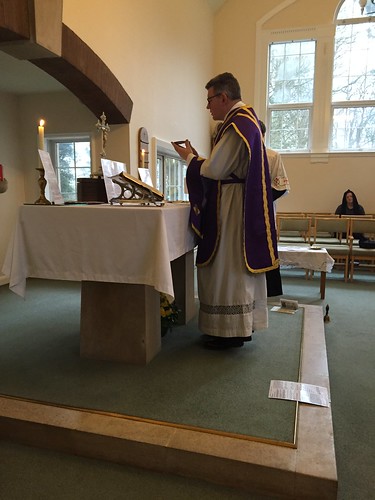 |
| Fr Richard Biggerstaff celebrating the Vetus Ordo in the chapel of the Carmelite Retreat Centre for the Guild of St Clare Sewing Retreat last year. |
Resideintial Latin course for adults 30th July to 3rd August 2018.
Since 2009 our intensive Latin course has helped a few dozen priests and laity to brush up their Latin for liturgical and scholarly purposes, in a Catholic atmosphere and with daily Traditional Mass.
Now it is taking place in a more accessible venue with more space and lower costs. Don't miss out!
Prices:
Full price is £340 (+ £30 optional single room supplement); without accommodation £290.
LMS Member £290 (+ £30 optional single room supplement); without accommodation £240.
Clergy, students and Seminarians full price £240 (+ £30 optional single room supplement); without accommodation £190.
Clergy, students and Seminarians LMS member £190 (+ £30 optional single room supplement); without accommodation £140.
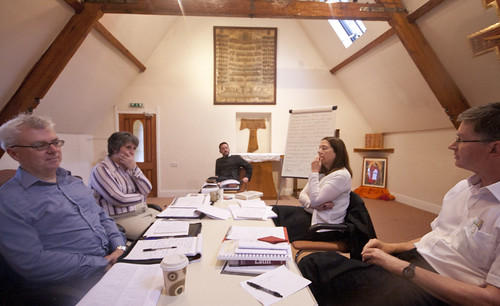 |
| Some Latin Course students with Fr Richard Bailey last year. |
Dominican Rite High Mass for St Thomas Aquinas in Oxford, 27th Jan
Support the work of the LMS by becoming an 'Anniversary Supporter'.
Catholic Medical Association 10th March, with me
The Catholic Medical Association invites all juniors and students of the healthcare professions (doctors, nurses, midwives, pharmacists, AHPs...), and all young people involved in the pro-life movement, to our next youth (18-35 years old) conference, entitled “Catholics in Healthcare: Men and Women of Conscience”.
Tyburn Convent, London. 11:15am registration. The conference will commence with Holy Mass (Missa Cantata) and talks will follow on The English Martyrs by one of the Tyburn nuns, Dr Joseph Shaw on conscience in healthcare and Dr John Smeaton (SPUC) on abortion and conscience.
Entry £10 donation, includes lunch, all profits to Tyburn Convent.
Sign up via event page on Facebook and EventBrite. Search “CMA England and Wales”.
Support the work of the LMS by becoming an 'Anniversary Supporter'.
Vermeule's mistake about human traditions
Adrian Vermeule has written a very interesting and in some ways helpful article in the Catholic Herald about the the nostalgia felt by a number of conservative/ traditionalist-leaning Catholic writers for the apparant live-and-let-live harmony between the Church and the 'liberal' state in the USA and elsewhere in the past, recent or not quite so recent. (I'll come to my disagreement with him in a minute.)
His argument is simply that liberalism is an ideology inherently hostile to the Faith with which no long-term, stable compromise is possible. He is absolutely right. As he writes:
Put differently, as I have argued elsewhere, the main “tradition” of liberalism is in fact a liturgy, centred on a sacramental celebration of the progressive overcoming of the darkness of bigotry and unreason. To participate in that tradition, that liturgy, is necessarily and inescapably to commune with and be caught up into a particular substantive view of time, history, world and the sacred – the liberal view.
The same point can be expressed in a slightly different way, from a historical perspective, which was made clear to me by reading Edward Norman's Secularisation. Norman points out that the brief golden age in the UK with neither religious intolerance from the dominant religion, or secularist intolerance from a liberal state, was simply a momentary equalibrium of forces in the long decline of the influence of the formerly dominant religion (Anglicanism) and the long rise in the power and self-confidence of the liberal state. This golden age - more like a golden mini-second - has inspired absurd amounts of political theorising, but was simply a moment when Anglicanism was too weak to assert itself against others but still too strong to be pushed around.
Vermeule goes on to say that we should seek eternal habitations and not place our trust in princes, though he doesn't express it quite like that. Again, this is correct. But he draws a rather surprising conclusion from this. He writes:
The typical mistake is to conflate the traditions of the Church with the traditions of the broader society. These are very different things; the Church is an ark afloat on a dangerous sea, which preserves its own internal traditions in part with walls that prevent it from being deluged by secular practices and mores. 1 Peter thus connects Catholic rootlessness and homelessness with a rejection of human political traditions, enjoining Catholics to “live out the time of your exile here in reverent awe, for you know that the price of your ransom from the futile way of life handed down from your ancestors was paid, not in anything perishable like silver or gold, but in precious blood …” Catholicism is not Burkeanism. Because Catholics are exiled in the world, they can ultimately have no attachment to man’s places and traditions, including political traditions.
I like the point that the Church has to protect itself from bad influences, but Vermeule makes a critical mistake in (apparantly) not considering the possibility that the political order be Christianised. Is this a possibility, he might ask? Well, Vatican II, in accordance with the whole tradition, demands that we at least try,
'to penetrate and perfect the temporal order with the spirit of the Gospel' Apostolicam actuositatem 5
And it would be rather strange if a society made up almost exclusively of believing Catholics should not, over several centuries, make some progress in this direction. Such societies have, of course, existed, and a glance at their political institutions and human culture in general confirms that, yes, with all the imperfections inevitable to fallen nature, they had made at least some progress. When considering the traditions of such societies, and the continuence in politics and general culture of these traditions in other societies which are not blessed with the same ideal conditions, does one really want to say that a Burkean respect for tradition has no value? Does one really want to say that no human traditions should be preferred to any other?
Even if there had never been any truly Catholic societies, even if one were presented with a choice between human traditions formed by pagan or secular societies, does one really want to say that we should not bother to respect and uphold the better, and oppose the worse? Do we really not care if polygamy and human sacrifice become the settled cultural expressions of the society in which we find ourselves, when we could work to preserve those cultural aspects of, say, Roman paganism, or modern liberalism, such as contain at least a fumbling and imperfect respect for the family and for human life, and which genuinely intersect with the Natural Law?
Vermeule's mistake is to extrapolate from a rightly pessimistic view of fallen nature, which is found throughout the Catholic tradition, to an implicit rejection of the possibility that nature can be redeemed. For the story with human culture parallels the story of human nature itself, since culture is the result of many humans living together. Fallen human nature is dominated by sinful desires, but it is not wholly evil: it is still capable of perceiving the moral law to some extent. Among pagans we find pity, honour, an appreciation of beauty, artistic and intellectual acheivements, and sincere religious aspirations. These good aspects of pagan societies are manifested in their traditions - as well as bad things.
Humans can, moreover, be redeemed, and this redemption has the effect of beginning a process of freeing them from error and confusion, allowing them to live better, if not perfect, lives consistently, allowing them to think more clearly, allowing them to undertake art and politics and everything else in ways less in slavery to sin. This has consequences for human traditions, for politics. The disappearance of redeemed humanity from the political and cultural scene has the contrary consequences. Listen to the popes:
…where religion has been removed from civil society, and the doctrine and authority of divine revelation repudiated, the genuine notion itself of justice and human right is darkened and lost…
Pius IX Quanta Cura §4
And
Therefore the law of Christ ought to prevail in human society and be the guide and teacher of public as well as of private life. Since this is so by divine decree, and no man may with impunity contravene it, it is an evil thing for any state where Christianity does not hold the place that belongs to it. When Jesus Christ is absent, human reason fails, being bereft of its chief protection and light, and the very end is lost sight of, for which, under God's providence, human society has been built up. This end is the obtaining by the members of society of natural good through the aid of civil unity, though always in harmony with the perfect and eternal good which is above nature. But when men's minds are clouded, both rulers and ruled go astray, for they have no safe line to follow nor end to aim at.
Leo XIII Tametsi Futura §8
Should we feel more at home in a society still visibly shaped by Christianity, with saints' names and religious holidays, with respect for property and some grasp of natural justice, than we would be under Nazism or Soviet Communism? Should we, finding ourselves in one of the latter societies, look back with nostalgia on the Christian past, and use the memories and traditions of that past, which still have resonance and force with our unbelieving compatriots, as part of a programme of resistance to evil and of restoration?
You bet we should.
By all means be pessimistic about the direction society is going in as Christ is rejected more and more completely. But don't repudiate your civic obligations, and don't repudiate those traditions and that past which are among our most effective means of evangelising those with whom we share, like it or not, a public culture. Neither of those repudiations are things we can 'afford', Mr Vermeule.
Support the work of the LMS by becoming an 'Anniversary Supporter'.

